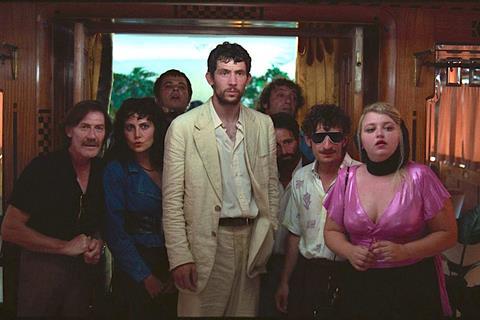Alice Rohrwacher’s fourth feature stars Josh O’Connor as an archaeological psychic in Italy’s Etruscan badlands

Dir/scr: Alice Rohrwacher. Italy. 2023. 133mins
Alice Rohrwacher turns the adventures of a bunch of tomb robbers in the Etruscan badlands north of Rome into an existential journey that is also an ode to the fragility of the beautiful things in life, and a cautionary tale about how easily they can be lost. Like its central character, an archaeological psychic played by British actor Josh O’Connor, this strange, messy, resonant film aims to unearth buried treasure. And, like the illegal excavations that provide its narrative baseline, it succeeds when it doesn’t worry too much about neatness and precision.
Part dreamscape, part modern folk tale
Neon acquired US rights ahead of La Chimera’s Cannes competition premiere, and it’s also set for release in Italy and France, but this relentlessly uclassifiable film may struggle to match the widespread international distribution of the director’s previous works The Wonders and Happy As Lazarus.
Little time is spent on narrative exegesis or place-marking. It takes a while to work out why O’Connor’s character Arthur, an irascible Englishman who lives and sleeps in a crumpled linen suit, fell out with the ragged group of Italian twentysomethings in the village he is seen returning to, as the film begins, on a slow country train. They are the youth in a village of old people, the ones who failed to leave, whereas Arthur (played by O’Connor in a bemused feeling-myself-into-the-role way that actually works well for his character) is a kind of shabby shaman, who lives in a shanty hut built up against the town walls – literally beyond the pale. Those with a little local knowledge will recognise in the film’s settings a swathe of coast and countryside around Tarquinia, north of Rome, where the pre-Roman Etruscan civilization once flourished.
As in her previous rural rables, Rohrwacher deliberately deprives her audience of geographical flags in order to push the story into territory that is part dreamscape, part modern folk tale. The ‘when’ of the action is equally slippery: haircuts, clothes and cars (particularly a beaten-up blue Fiat 126 with a peppy personality of its own) suggest the late 1980s but time gets tugged in various directions. The same chimeric vein is mined by a soundtrack that hops between Renaissance opera composer Claudio Monteverdi and Italian stadium rocker Vasco Rossi.
Arthur turns out to be a diviner of buried spaces, one subject to trances that leave him drained. He uses a Y-shaped sapling to alert him to empty cavities in an area peppered with Etruscan tombs, which – depending on whether past tombaroli (tomb-robbers) have already visited – may or may not contain grave goods in terracotta, marble, bronze or gold. There’s a Robin Hood aspect to the village friends he soon falls back in with. Loosely led by genial Pirro (Vincenzo Nemolato), they’re a band of chancers who have adopted Arthur as their spirit guide to dirty money (the lira banknotes counted out here are literally filthy).
Much like the villages, train stations and roads of this scruffy hinterland they have been abandoned by the distant powers-that be, and view the cash they make from their nocturnal digs as a kind of self-awarded rural enterprise subsidy. In some ways they live for the day, easy and free, partial to wine, like stereotypical modern Etruscans (who, it is also suggested, are more respectful of women’s rights and more open to gender fluidity than the macho Romans). Running beneath their camaraderie and admiration of the pretty things they find in chambers dug painstakingly by hand in the tufa rock is a vein of violence that comes increasingly to the fore, before La Chimera veers into the sunlit uplands of its oneiric finale.
As in her previous work, Rohrwacher seems to have back-written the story from a series of personal visions that she deploys like the panels of some modern-day Medieval fresco. One centres on a fading aristocratic villa inhabited by Isabella Rossellini’s imperious former opera singer Flora and awkward Italia (Carol Duarte), the wannabe soprano she took on as a student but uses and abuses as a housemaid. Talking over each other, Flora’s bevvy of red-haired adult daughters flit in and out like carping harpies. They may or may not actually exist – rather like Beniamina, another of the daughters, who Arthur was engaged to, but who has since disappeared.
Seemingly operating on instinct even more markedly than the impressionistic The Wonders, Rohrwacher tries out various tactics – characters talk directly to camera, a strumming bard recounts Arthur’s story like a troubadour poet, certain sequences are comically sped up, Keystone-Cops-style.But no sooner does La Chimera lose its balance than it rights itself again. Shot with sensitivity to natural light (and darkness) by Rohrwacher’s go-to DoP Helene Louvart, this is a film about an out-of-joint-world, where nature has been ravaged, the dead desecrated, the earth despoiled for trivial, short-term gain, and communities forsaken. But for all our failures and hapless attempts to set things right, it reminds us that beauty somehow persists.
Production companies: Tempesta, Rai Cinema
International sales: The Match Factory, info@matchfactory.de
Producer: Carlo Cresto-Dina, Manuela Melissano
Production design: Emita Frigato
Editing: Nelly Quettier
Cinematography: Helene Louvart
Cast: Josh O’Connor, Carol Duarte, Vincenzo Nemolato, Lou Roy Lecollinet, Giuliano Mantovani, Gian Piero Capretto, Melchiorre Pala, Ramona Fiorini, Isabella Rossellini, Alba Rohrwacher























